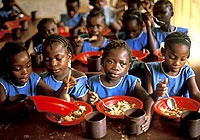The Ghana School Feeding Programme (GSFP), arguably one of the most important social interventions by government to help boost enrollment in public basic schools, though yielding fruitful results, is gradually taking a nose-dive according to stakeholders involved.
The Programme which was initiated by government to boost the nutritional needs of basic school children is merely limping along, as the release of funds for the smooth running of the programme is not forthcoming.
This policy, meant to provide one nutritious meal each school day for all infant and primary school children (4-12 years) has encountered a lot of shortfalls.
Since its inception, the GSFP has been bedeviled with numerous challenges including poor sanitation, low quality of food served, delays in paying caterers and lack of transparency.
The government has been forced to sacrifice the Programme for other policies because of a lack of funds and consequently, the contracted caterers are unable to receive the requisite compensation for their services, forcing them to cut corners and thereby compromising on the quality of food being fed to hundreds of thousands of basic school pupils every lunch time.
The inconsistent flow of money from the Ministry of Finance to the GSFP secretariat for onward distribution to the caterers contracted to prepare the food for the children is one of the main problems bedeviling the programme.
Although Siiba Alfa, Public Relation Officer of the Secretariat noted that a caterer’s ability to pre-finance the project was a major consideration for the selection; most caterers run out of money and are forced to prepare foods that do not meet the specification of the Programme.
The government’s budget allows a paltry 40 pesewas for each pupil per day, an amount that has drawn sneers from critics because 40 pesewas can hardly satisfy the needs of a growing child. Indeed, 40 pesewas can hardly buy an egg in these days. Mr. Alfa said, “The caterer must have knowledge in mass cooking… We also want the caterer to demonstrate the capacity to pre-finance the Programme because we don’t pay up-front as we wish we would have.”
Most caterers are unable to continue with the regular meals they serve the children because of the late release of funds. In July 2013, the media reported that about 5,000 caterers across the country had not been paid since the beginning of the year. The caterers were forced to go contrary to their mandate of serving food five times a week to three or two times a week.
The money was released to the caterers after media publication, but most caterers are still using their own money to prepare the food.
A caterer at one of the schools at Tema, Agnes Hador, said the children are fed once each day, five times a week with different types of food depending on the day of the week. “Some of the foods we serve them are rice balls with groundnut soup, waakye, banku, jollof and beans with plantain,” she said. However, although Ms. Hador could not specifically state the number of children she catered for each day, she noted that every child got at least a plate of food.
She admitted that sometimes she has to wait two to three months for the money she used to prepare the food to be released to her.
Another caterer, Patience Koomson, said the catering is more or less a contract so she makes the food with her own money and supplies. She said a bill is then sent at the end of each day to the GSFP who in turn contacts her to come for her money, usually after a period of two to three months.
The programme was established in 2005 by the Government of Ghana and the Dutch Government as a means to boost domestic food production and increase school enrolment, attendance and retention among kindergarten and primary school children.
The programme, which received widespread praise when it was established, was inspired by the Comprehensive African Agriculture Development Programme (CAADP) Pillar 3 of NEPAD under the recommendations of the United Nations Millennium Task Force on Hunger.
Soon, the effects of the programme started showing with school enrollment shooting up. Attendance and retention among kindergarten and primary schools in areas which used to record low numbers started increasing almost immediately.
Positive feedback on the impact of the GSFP was soon rife and the one hot free lunch (popularly called “aban aduane” among the children) soon became a household name in the country.
However, the general deterioration of the Ghanaian economy from 2012 came to have a telling effect on the GSFP programme, resulting in the trickling monetary allocation for caterers engaged by the programme to cook for the children.
The amount of the food served saw a significant reduction, contrary to what many school pupils would have wanted. Others had to reject the food because they claimed it tasted horrible and not nutritious.
Joel, a pupil at the Tema Cluster of Schools told SCANDAL that he does not eat the food provided under the GSFP because he does not enjoy it. According to him, he ate it the first week he enrolled in the school, but had to stop, as the food was not appealing to him.
In reacting to the children’s statement, Ms. Koomson said they usually rush in the preparation of food such as waakye or plain rice and stew, stating that because rice is expensive and that she has to cook almost a bag any day she makes rice, she could not please them by making only the kind of food they preferred.
She complained that, at times, the pupils purposely waste the food. For instance, when they are served with rice balls and groundnut soup, they pour the soup on the rice balls and return the food back to her, she said.
The Manhean Primary School children in Tema complained that the food served by the cooks in their school is insufficient and therefore does not satisfy them.
“We don’t get satisfied when we consume the food,” they said. “But we are not granted the opportunity to ask for some more of the food even if what we have taken wasn’t enough.”
Majority of the schools in Greater Accra, especially the Accra Metropolis, have been taken off the school feeding programme.
Mr. Alpa conceded this as the most logical thing to do under the extreme and dire circumstances the programme was facing.
The usual excitement of students during lunch time in schools was clearly absent in most schools visited. The head teachers would rather not discuss the disheartening situation with prying journalists.
Mr. Alfa gave a curious explanation to the reasons why the programme has been taken off many schools: “The programme first targeted the wrong areas of the country so we did retargeting...because of limited resources,” he said.
Corporal Frank Bora at the Police Education Unit, one of the schools that were affected by the retargeting said though initially the Police Depot Unit School was included in programme, it did not enjoy the Ghana School Feeding Program privilege anymore.
He said the programme was scrapped from the school when the authorities realized that it was mostly needed in the rural areas.
Confirming Corporal Bora’s stance that most government primary schools in Accra no longer participated in the feeding programme, the Headmistress of Nima Cluster of Schools said her school was not a beneficiary of the programme, as the government had considered the school as privileged since the feeding programme was supposed to cater for needy children.
Mr. Alfa said because of the tendency for some caterers to take undue advantage of the slow flow of money to compromise on the quality of food prepared, the programme had set up committees at the district level which include food inspectors and nutritionists to make sure the caterers comply with the terms of the contract.
He said all the stakeholders involved in the programme have committees set up to ensure that the effectiveness of GNSF is assured.
“We have intensified the monitoring activities because sometimes the caterers may be motivated by the profit they are making, so they want to make profit at the expense of the children. We have given motorbikes and cars to our monitors, who pay unannounced visits to the schools to facilitate their work.”
Mr. Alfa said since the introduction of the monitors in 2009, they have helped to ensure the targeted people benefit.
The country currently has 1.7 million children benefiting from the program, but Alfa said plans were underway to increase the number of children.
“The country is thinking to extend it to two million – approximately 300,000- more to be sent to the neediest areas.”
He explained that the general economic trend and consideration of several proposals urging government to increase the feeding grant has informed the action.
“This is also being done so that the caterers will not have an excuse of telling people that it is because the feeding grant is woefully inadequate that they also compromise on the quality of the food,” he said.
He called for a collaborative effort to ensure the success of the social intervention programme.
“All of us must come together to ensure that the school feeding programme becomes more successful than it is now,” he added.
General News of Monday, 27 January 2014
Source: The Scandal
School feeding program is a mess













